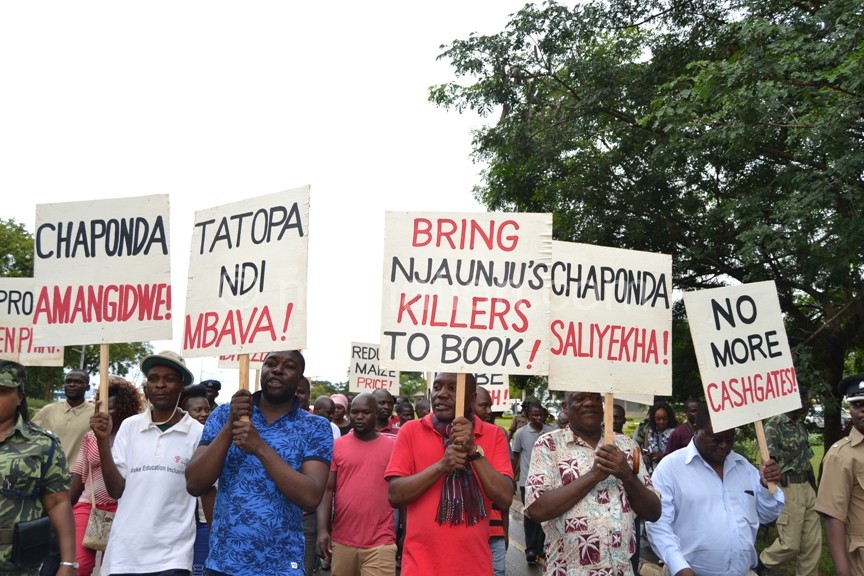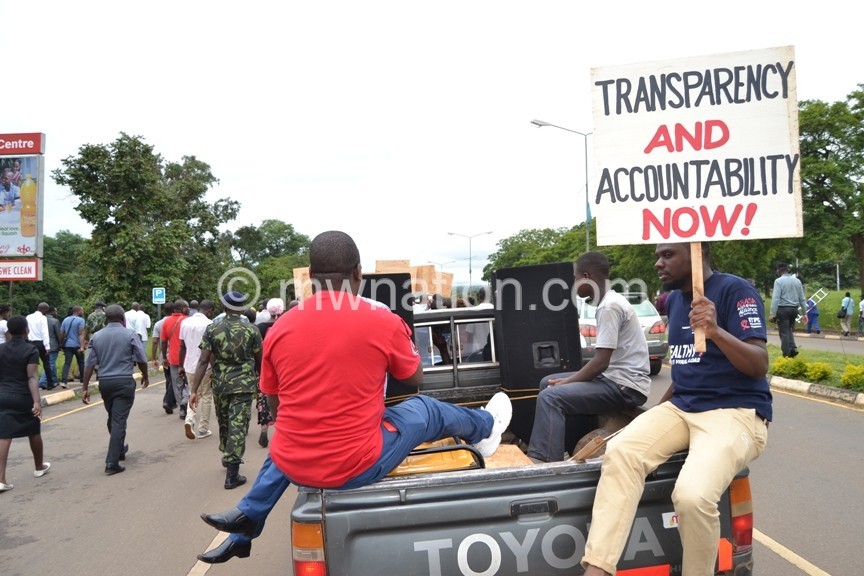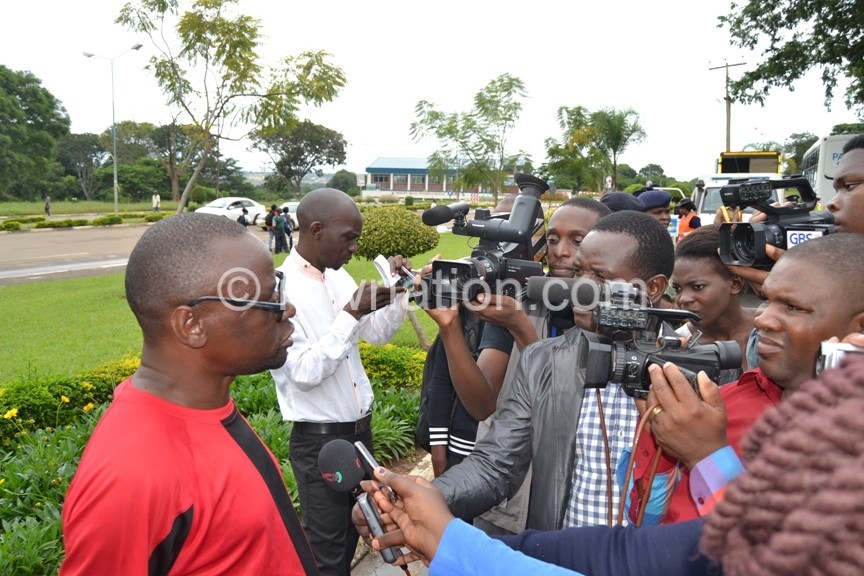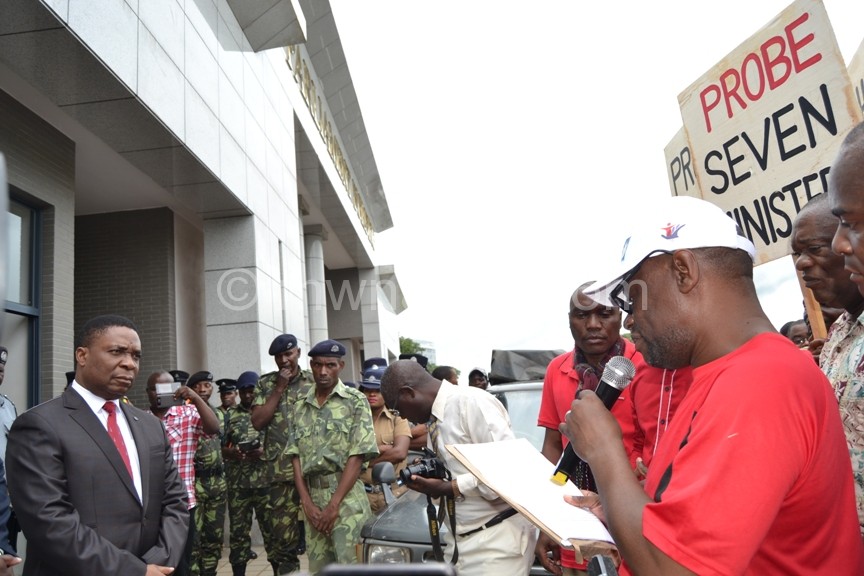CSOs demos flop again: Demos about spirit, not numbers—Mayaya
It flopped again. The public outrage against high level corruption and impunity in government, especially in the aftermath of the maizegate, yesterday failed to translate into crowds of protesters in Lilongwe despite CSOs’ rallying call for the masses to show solidarity against the vices.
A handful of people, close to 20, turned out in a drizzly weather for the highly publicised demonstration which civil society organisations (CSOs) maintained its success was not in the numbers of people who availed themselves but the spirit to do something about graft.

A political scientist has since warned against ignoring the powers and significance of the demonstrations, arguing authorities should not be fooled by the poor turnout.
The protest march started at City Centre in Lilongwe via Presidential Avenue an hour later than the scheduled 8am as the group, which was largely outnumbered by police officers escorting them and journalists, carried placards depicting areas of concern that President Peter Mutharika should act on.

Some of the placards read: “Tatopa ndi mbava,” “No more Cashgates and “no shielding of corrupt ministers”.
The protestors, who included Reverend McDonald Sembereka, Gift Trapence of the Centre for the Development of People (Cedep) and activist Billy Mayaya, want government to act on high levels of corruption, politicisation of operations of government institutions; persistent water shortages and electricity blackouts as well as the collapsing economy and nepotism.

On the fight against graft, the CSOs have since asked government to stop fooling Malawians on the 2009-11 K236 billion Cashgate, saying the report be made public and that those named face the law.
“We need [not] over-emphasise the devastating impact Cashgate has had on Malawians. As such, the least Malawians can expect is a leader who chooses which regime of Cashgate to prosecute.
“We also demand the commencement and full implementation of all recommendations from both Joint Parliamentary Commission and Presidential Commission on the maize procurement. We also want an immediate reduction of the maize prices in Admarc to allow poor Malawians to access the commodity,” reads the petition in part.

The CSOs also called upon government to respect, protect and safeguard constitutional rights of citizens regardless of one’s political affiliation, tribe, religion and region. They claim there has been continued reign of threats and terror orchestrated by the ruling DPP against government critics or those with dissenting view.
“The DPP led government must stop practising Machiavellian politics. In our view, the DPP has not reformed. It is resorting to the same old underhand tactics in silencing its critics,” it reads in part.
Those quoted in the petition as to have been subjected to hostility include Charles Kajoloweka, Gift Trapence, parliamentarian Kamlepo Kalua, critic Stanley Onjezani Kenani, academician Blessings Chinsinga; columnist Madalisto Musa and Times Group editor -in -chief George Kasakula.
It was ironic that their petition to the National Assembly was received by one named in the petition, Rumphi East lawmaker Kamlepo Kalua, but protestors had to wait for half an hour before Kalua emerged from the chamber to receive the petition.
He later explained in an interview that he was on the floor, making his contribution towards the now-passed revised budget.
“It’s not that we were hesitant as Parliament; neither should this be mistaken as a sign that we don’t recognise the efforts of the marchers. Protocol demands that one just can’t abandon their call in the House so suddenly,” he said.

Speaking after receiving the petition, Kalua said there were signs to suggest that that the country would win its war on graft, hailing the protestors for their courage.
“From the look of things, I can confidently say we are with you on this one; we are winning this war against corruption,” said the legislator, who also co-chaired the joint parliamentary committee on the maize inquiry.
But one activist Billy Mayaya blamed the low turnout on unfounded rumours emanating from their detractors that the demonstrations had been cancelled at the eleventh hour, something he described as “rubbish tactics from government operatives.”
He argued the low turnout was not important but the spirit of the protest organised.

“Well, I think it’s simply government’s attempt to divide and rule. As you are aware, there is also a civil society which appears now and then on the State broadcaster, but I think we abide by law and simply exercise our birthright of freely expressing ourselves on any matter of national importance,” said Mayaya who in October 2015 organised demonstrations that also flopped and was arrested together with two colleagues for conducting a protest without authority.
He claimed presidential adviser on non-governmental organisations Mavuto Bamusi approached him at the eleventh hour yesterday to try to cancel the protests.
When contacted for comment, Bamusi admitted to have contacted the Mayaya camp, “But only to save their face as my office had also received news that churches were also organising their demonstrations on the same. I just felt they could have saved some energy in conducting the demonstrations together. Look now what happened today?”
A University of Malawi political scientist Boniface Dulani, however, defended demonstrations regardless of the low turnout, arguing the factors that led to low turnout did not militate against their significance.
“But I don’t think that gives government the leeway. The public can’t allow the government to get away with poor governance. I hope the numbers would have been different were it that the issues skirted around ‘bread and butter’, like it was during the 2011 nationwide demonstration,” he said.
Dulani also argued that the willingness in people to go and demonstrate against a regime tend to come in waves, adding factors include security fears, issues at hand and the general coordination of the protests.
Asked to explain government’s reaction on the issues raised in the petition, Minister of Information and Communication Technology Nicholas Dausi asked for more time as he had not seen the petition.
But when taken through the issues raised, the minister accused the CSOs of working on assumptions.
Said Dausi: “They have nothing to say. I mean, such issues could have been ironed out through contact and dialogue and the only reason they rushed to the streets is because they have a pathological hatred of government. They seem to have had a premeditated mind on this so much that they felt dialogue couldn’t have worked for them. Still, they exercised their right [to freedom of expression] and that says volumes of how democratic this government is.”





